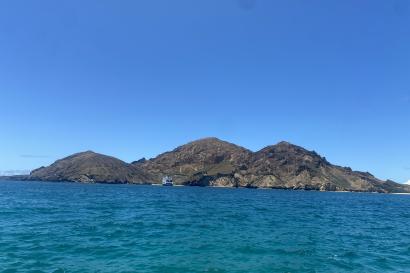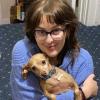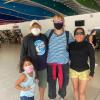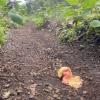Being queer, the concept of “found family” is not new to me.
I have spent Christmas on a number of couches, pulled family together like patchwork. My family has always been a fluid and shifting body, with newborns as old as sixty-five, and parents as young as I am. What held us together was place; we all lived along the same stretch of river. All I know of family is there. Coming to the Galápagos, I was terrified that, for the first time in my life, I would be completely alone. An unfamiliar culture, an unfamiliar landscape. I had never been to a place where I didn’t speak the language, and I was terrified that I would spend the next semester stuck inside my own head, unable to make friends or family here. I spent the weeks before my flight tightly grasping onto each one of my friends, assuring them (more myself) that the four months would pass in no time. But, I was soon shocked to find that love is not as scarce as I had imagined it to be.
On my first day here, my host mother made certain to assure me that, for the next four months, she was my mother. I came home every night to home cooked meals, my mother perched on the counter, asking me questions about my day. I struggled through my responses in Spanish, and she hung patiently onto every word. I came home to freshly washed laundry, a made bed, a bowl of mints on the corner of my desk. She gave all the things that are, culturally, materially, motherhood. But, until I landed myself in the hospital a few weeks ago, I hadn’t yet realized the extent to which her love extended. Though we were living as mother and daughter, I didn’t expect the animal love to leap like it did: how my mother held my hand in the waiting room, our heartbeats joining in the veins of our palms. All day, she stayed home to cook soup, boil water. She would check on me every half hour, place a hand to my forehead, monitoring my heat. Even though my Spanish is far from fluent, there is a universal language between my host mother and I. She brushes the damp hair from my feverish brow. She says the words I know for certain, “te amo, hija,” and it is as if I have found a key I have spent my whole life searching for. A mother.
Here, I have discovered how love can leap borders of country, of continent. How the arms of family can stretch open wide.
In class, I learn that family goes beyond shared genes. According to new studies in genomics*, there are infinite horizontal relationships between the microbes in our bodies and the microbes in other organisms. Genetic material is not only passed down, it is passed across. During pregnancy, women gain as much genetic material from the child as the child gains from them. You are as much your family as you are your river, your dog, the lice you spread with your first grade class. Beings in close contact manipulate each other’s genetic code. This is not new information, though. Indigenous peoples of the Americas have known this for centuries. Sherri Mitchell Weh’na Ha’mu Kwasset, the author of “Sacred Instructions,” speaks on the relationship between quantum entanglements of physics and the Web of Life of the Wabanaki people. There are deep connections that exist between all things; “…any matter that was once connected physically cannot be separated energetically.”
If all things are made from the Earth, all things are energetically entwined with each other. When you share a home with someone, the proximity to each other changes both of you. I watch my host mother mirror my posture at dinner, as I begin to mirror the cadence of her speech. I find my host father spreading avocado onto his patacones, as he watched me do at our first breakfast together. I realize that we are becoming each other, bit by bit. Here, I watch the myth of the genetic family fragment to even finer pieces. If all our blood is energetically entwined, we are family. We have always been. And the longer we spend together, the more family we become.
In my Political Ecology class, we have been discussing the indigenous feminist concept of “making kin,” used notably by both biologist/author Dr. Robin Wall Kimmerer and ecofeminist scholar Donna Harraway. In Harraway’s work, she urges people to “Make Kin, not Babies!” In order to save the planet and ourselves, humans must, rather than continue their genetic empire, reach across borders to make relationships with each other and the natural world. Borders of family, yes, but also borders of species, borders of kingdom. Making kin is a choice that you make, not just a unit that appears by happenstance, by pregnancy. Kin are beings that you consciously choose to make kin with.
In this Western-colonial society, we have been conditioned over thousands of years to draw boundaries between each other. Who is family, who is not. Who is “us” and who is “other.” Not only among other humans, but among the plants and the animals, too. When South America was first colonized by Spain, the argument for colonialism was justified in the devilishness of the land: how hot, how wet, how thunderous, how completely un-civilized.
I can see this legacy in me.
When I first arrived in the Galápagos, I felt as though I couldn’t be further from home. The landscape was unfamiliar to me: sand instead of prairie, cacti instead of trees. Everything around me felt strange and uninviting, and I felt homesick for my river, my grass. I was unsure how to place this unease.
When Donna Harraway speaks on kin-making, she remarks that “ancestors turn out to be very interesting strangers; kin are unfamiliar… uncanny, haunting, active.”
All I have ever known of water is the lake, wide and still. The river and its rushing gravity. At first, I held a deep fear of the ocean and her vast, churning body. It is an energy I am wary of– one might say, uncanny, haunting, active. I was uncertain of how to connect with something that felt so foreign, so other than me. How could I possibly make kin with this stranger?
The moment that changed me was when my class went to Isla Española, and our tour guide, Doménica, led us through a mindfulness exercise on a cliff overlooking the ocean. She instructed us to breathe deeply, feel the energy of the volcanic rock beneath our feet, to feel the magma’s pulse reverberate the pulse of our breath through time: of our conception, our birth. Our ancient, ancestral connection to the movement of the waters. I felt my heartbeat sync with the crashing. I took the time to really feel what she spoke to me, deep into my body. Against all odds, the ocean, this stranger, became my kin, too.
It was as if something cracked and opened inside me. After, I began realizing more and more how love can leap borders of species, of kingdom. I watched baby sea lions breastfeed on the sand, and the animal inside myself responded in profound, ancient love. I am trying now to accept and love my most unfamiliar kin. I realized that I had been perceiving the landscape in a deeply colonial way. As a thing, or a set of things to observe, or capture, rather than a vast array of interactions I was participating in, and with, the same material as my own body.
Othering nature makes it easier to abuse. Like a child, smashing an anthill with their heel, or a scientist, torturing rats to see how their brains might respond. When Dr. Robin Wall Kimmerer came to speak at Macalester last year over Zoom, she brought up the idea of kin in relation to science. Kimmerer told us that the greatest issue with the hard sciences is the language used to objectify the subjects of study. We point at a plant, say, pick it. To refer to a plant or an animal as an “it,” Kimmerer says, dismisses the life inside of the being. The plant or animal becomes as object as stone, a chair, a brick. This way of naming distances the scientist from the natural world, alienating the human being as something independent of the energy shared among the living: our carbon, our water, our shared breath. She proposed an alternative pronoun: ki and kin. “Kin are ripening in the fields.. kin are flying south for the winter…”
When I learn that Lonesome George, the last tortoise of his species, was desperately kept alive by forced self-sustainment, when I learn that his body is currently taxidermied, his ghost looking out over the Charles Darwin Research Center, I wonder how much of species preservation is truly for the benefit of animals, as it is for the collection of animals as trinkets, as things. I wonder how much of conservation is truly kin-making and camaraderie between species, or how much of science may actually be violence.
As I understand Kimmerer’s words, when we speak of plants and animals as family, as kin, we tune our perception of the world to a kinder frequency, one in which we do not position ourselves as superior to any other being, any other people, any other life. What is conservation if we are distinctly separate, so paternalistically manipulating the environment for “its own good”? Do we really make kin, or are we guardians in the way of a controlling parent, projecting our own wants onto the life of the child? How different is the preservation of the mangrove finch to forcing a child to stay in soccer, just so you can watch them win? I do not know the answer to this. But if kin-making has taught me anything here, it has taught me that I need kin beyond my family to heal the wounds of my fragmentation. So, I would guess, in the age of the sixth extinction, the environment needs our kinship to heal too.
References
*Noticing Microbial Worlds: The Postmodern Synthesis in Biology by Margaret McFall-Ngai
Anthropocene, Capitalocene, Plantationocene, Chthulucene: Making Kin by Donna Harraway
Doctor Robin Wall Kimmerer’s “Speaking of Nature”
Sherri Mitchell Weh’na Ha’mu Kwasset

Anna Sverclova
My name is Anna Šverclová. I'm a published poet and creative writing major at Macalester College. I love exploring the world around me. You can almost always find me digging in the mud by the river, journal in my back pocket. My writing focuses on my relationship with the world, childhood trauma, and my hometown. I write both for the page and for performance. You can find me at annasverclova.com








